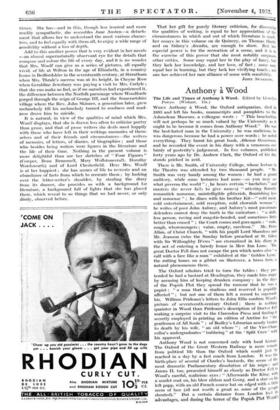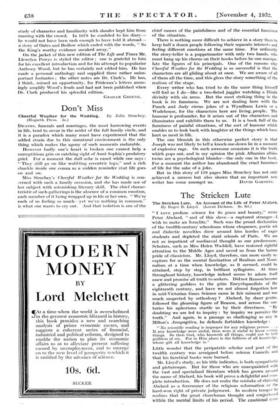Anthony i Wood
WHEN Anthony a Wood, the Oxford antiquarian, died In 1695 and left his books, manuscripts and pamphlets to the Ashmokan Museum, a colleague wrote : " This benefaction will not perhaps be so much valued by the University as it ought to be because it comes from Anthony Wood." He was the best-hated man in the University ; he was malicious, he was dangerous because he had a power over words ; he noted everything. They burnt his great book, AtIzenae Oxtmiensis, and he recorded the event in his diary with a venomous tee. tainly of posterity's judgement. In five volumes, published forty years ago by Dr. Andrew Clark, the Oxford of his day stands pricked in acid.
There is Mr. Smith, of University College, whose lecture in the °Theatre was attended by two thousand people. " Mr. Smith was very baudy among the women : he had a grand auditory, while some lecturers had none—so you may see what governs the world" ; he hears certain " bachelors" and masters (he never fails to give names) "uttering fluently romantick nonsense, unintelligible gibberish, flourishing lyes and nonsense " ; he dines with his brother Kit—" cold meat, cold entertainment, cold reception, cold clownish woman "; he writes of poor John Aubrey, and Aubrey's most passionate defenders cannot deny the truth in the caricature : "a shift- less person, roving and magotie-headed, and sometimes little better than erased " ; the Court comes and goes again : "rude, rough, whoremongers; vaine, empty, carelesse." Mr. Peter Allan, of Christ Church, "with his pupill Lord Shandoes and Mr. Jeanson (who the Sunday before preached at St. Giles) with Sir Willoughby D'ews " are eternalized in his diary in the act of entering a bawdy house in Mew Inn Lane. The great Doctor Fell does not escape the pen which notes also a calf with a face like a man" exhibited at the 'Golden Lyon.' the rotting bones on a gibbet on Shotover, a brass here, a natural phenomenon there.
The Oxford scholars tried to turn the tables : they pre- tended he had a bastard at Heaclington, they made him angry by accusing him of keeping drunken company : in the days of the Popish Plot they spread the rumour that he was a papist : "a man that is studious and reserved is popishly affected " ; but not one Of them left a record to supersede his. William Prideaux's letters to John Ellis confirm Wood's picture of seventeenth-century Oxford ; there is nothing quainter in Wood than Prideaux's description of Doctor Fell making a surprise visit to the Clarendon Press and finding it secretly employed in printing an edition of Aretine for 'the gentlemen of All Souls " ; of Bodley's Librarian nearly beaten to death by his wife, "an old whore " ; of the Vice-Chan- cellor's undergraduates " bubbeing " at the 'Split Crow' with his approval.
Anthony Wood is not concerned only with local history. The Oxford of the Great Western Railway is more remote from political life than the Oxford which could just be reached in a day by a fast coach from London. It was the birth-place of several of Charles's bastards, the scene of the most dramatic Parliamentary dissolution of his reign ; and James II, too, presented himself as closely as Doctor Fell to Wood's careful, malicious eyes : "Afterwards the King, with a scarlet coat on, his blew ribbon and Georg, and a star on 11 left papp, with an old French course hat on edged with a little seem of lace (all not worth a groat as some of the peoPle shouted)." But a certain distance from London had its advantages, and during the terror of the Popish Plot Wood's study of character and familiarity with slander kept him from running with the crowd. In 1679 he confided to his diary— he would not have been rash enough to have told it abroad—
story of Oates and Bedlow which ended with the words, " So the King's worthy evidence sneaked away."
On the jacket of this new edition of The Life and Times Mr. Llewelyn Powys is styled the editor ; one is grateful to him for his excellent introduction and for his attempt to popularize Anthony Wood, but he has certainly not edited him. He has made a personal anthology and supplied three rather unim- portant footnotes; the other notes are Dr. Clark's. He has, I think, missed an opportunity, for Prideaux's letters amus- ingly amplify Wood's feuds and had not been published when Dr. Clark produced his splendid edition.
GRAIIAM GREENE.











































 Previous page
Previous page